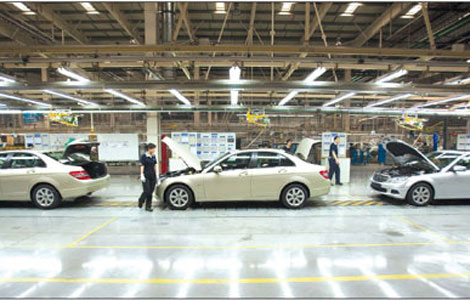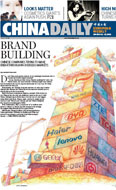Economy
Move to improve tax rule means business
Updated: 2011-03-15 09:56
By Hu Yinan and Cao Li (China Daily)
|
 |
|
Medium- and low-wage earners are the principal beneficiaries targeted by proposed revisions to individual income tax. [Photo / Xinhua] |
About 63 percent of China's individual income tax in 2009 was paid by wage earners, whose taxes are directly debited from their salaries, according to the Ministry of Finance. Numbers for 2010 haven't been released yet.

According to tax authorities in Yibin, Sichuan province, only 26 million Chinese, less than 2 percent of the country's population, pay the tax.
Individual income tax makes up just 6.5 percent of China's annual revenue, compared with more than 40 percent in the United States.
Under existing policies, low-income groups shoulder the bulk of the tax responsibilities of the rich, independent economist Andy Xie of Shanghai wrote in a commentary early this month. The top individual income tax rate is 45 percent but the company rate tops out at 25 percent, and Xie said the rich can set up companies and spend money for personal purposes out of business expenses.
Instead of narrowing the income gap, "the high tax rate weighs down white-collar workers, robbing them of the chance to become solidly middle class. (It) is pushing China toward a small super-rich class and a vast underclass," Xie warned.
Xie's view has been echoed by the public. The taxi driver who complained to Premier Wen online on Feb 27, for example, said he earns 2,300 yuan a month, just above the individual income tax entry mark. "It's not fair that wage earners have become the biggest Chinese taxpayers," the driver said in an online post.
The average wage in the non-private sector in 2009 was 2,728 yuan, meaning that any typical State employee would have to pay taxes.
|
||||
The issue was most recently addressed by revised regulations on fapiao (tax invoices) that took effect in February. Business expenses reimbursed from fapiao are a major source of income for many who seek to boost their non-taxable income, because the reimbursements are not included in their salaries.
As a result, vendors of fake fapiao are common in Chinese cities, according to Xinhua News Agency.
Some 780 million fake fapiao had been confiscated, and 12,900 cases of fake invoice-related crimes had been uncovered, from 2008 to late November, the Ministry of Public Security said.
E-paper

Factory fever
Despite auto manufacturing bubble scare, car giants gear up expansion of factories.
Preview of the coming issue
Dressed for success
Fabric of change
Specials

Earthquake Hits Japan
A massive 8.8 magnitude quake hit the northeast coast of Japan on March 11,2011.

NPC & CPPCC sessions
Lawmakers and political advisers gather in Beijing to discuss major issues.

Slide: Japan quake
Devastating earthquake and tsunami left millions without water, electricity, homes or heat.




